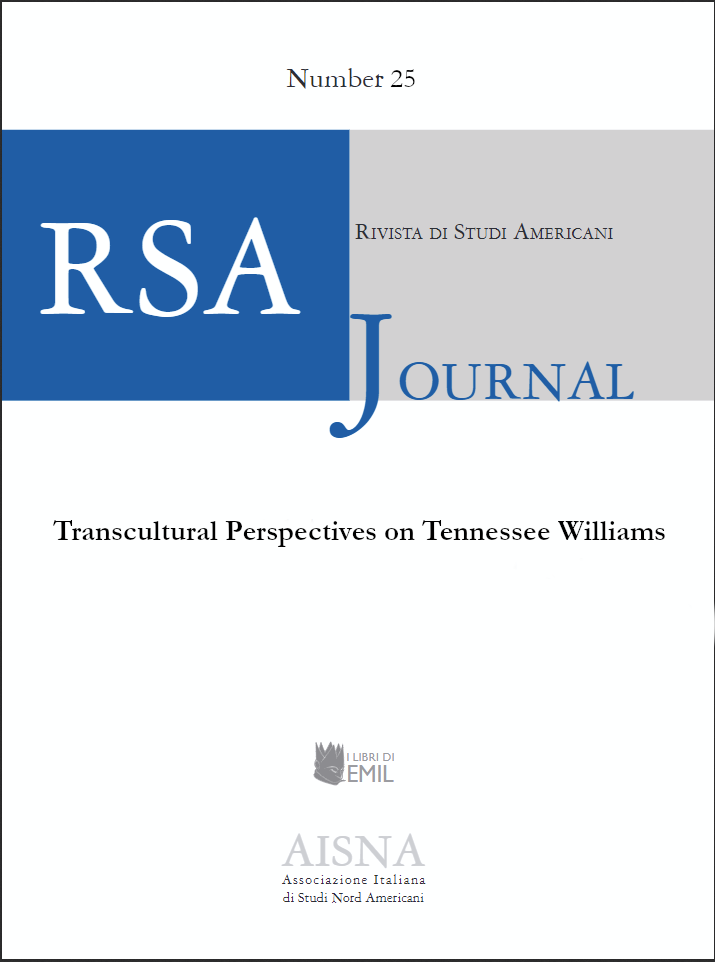Denied Citizenry and the Postnational Imaginary
Arab-American and Muslim-American Literary Responses to 9/11
DOI:
https://doi.org/10.13135/1592-4467/8617Parole chiave:
Arab-Americans, Muslim-Americans, 9/11, denied citizenry, postnational imaginaryAbstract
This paper documents the emergence of a new sub-genre of U.S. literature, encompassing narratives focusing on the social and cultural backlash on Arabs and Muslims in the U.S. in the wake of the 9/11 terrorist attacks. This body of literature, produced by a new generation of authors of Middle Eastern descent writing in as well as outside the U.S., engages the problematic construction of the Middle Eastern (often summarily stereotyped as “Arab,” “Islamic” or “Muslim”) in the U.S. as disidentified citizen in the age of the War on Terror. In so doing – and more importantly – this new sub-genre calls for an urgent revision of notions of national literature, as it reflects new modes of diasporic citizenry in U.S. society and its representation in the new century. Deeply confronting conflicting notions of denied citizenry and exclusion in post 9/11 U.S., recent works by Mohsin Hamid, H.M. Naqvi and Moustafa Bayoumi (among others) bring to the foreground the emergence of what I call, after Donald Pease, a Postnational Imaginary, and engage literary studies to reassess the role of the postcolonial in twenty-first century American Studies as a scholarly discipline.
##submission.downloads##
Pubblicato
Fascicolo
Sezione
Licenza
Avviso sul Copyright
RSAJournal applica una licenza CC BY-NC-ND a tutti i suoi contributi. Questa licenza consente agli utenti di copiare e distribuire il materiale in qualsiasi supporto o formato solo in forma non adattata, per scopi non commerciali e a condizione che venga esplicitato/a l'autore/autrice dell'opera. CC BY-NC-ND include i seguenti elementi:
- BY: L'autore deve essere riconosciuto come tale.
- NC: Sono consentiti solo utilizzi non commerciali dell'opera.
- ND: Non sono consentite opere derivate o adattamenti dell'opera.
Gli autori che pubblicano con questa rivista accettano i seguenti termini:
- Gli autori conservano il copyright e tutti i diritti di pubblicazione per i loro contributi alla rivista.
- Gli autori concedono alla rivista il diritto di prima pubblicazione in base alla licenza internazionale Creative Commons Attribution-NonCommercial-NoDerivatives 4.0, che consente ad altri di condividere l'opera non modificata per scopi non commerciali a condizione che venga esplicitato/a l'autore/autrice dell'opera e la sede di pubblicazione iniziale (questa rivista).
- Gli autori sono in grado di stipulare accordi contrattuali separati e aggiuntivi per la distribuzione non esclusiva della versione pubblicata dalla rivista (ad esempio, per inserirla in una repository istituzionale o pubblicarla in un libro), con l'indicazione che il contributo è stato precedentemente pubblicato in RSAJournal.




